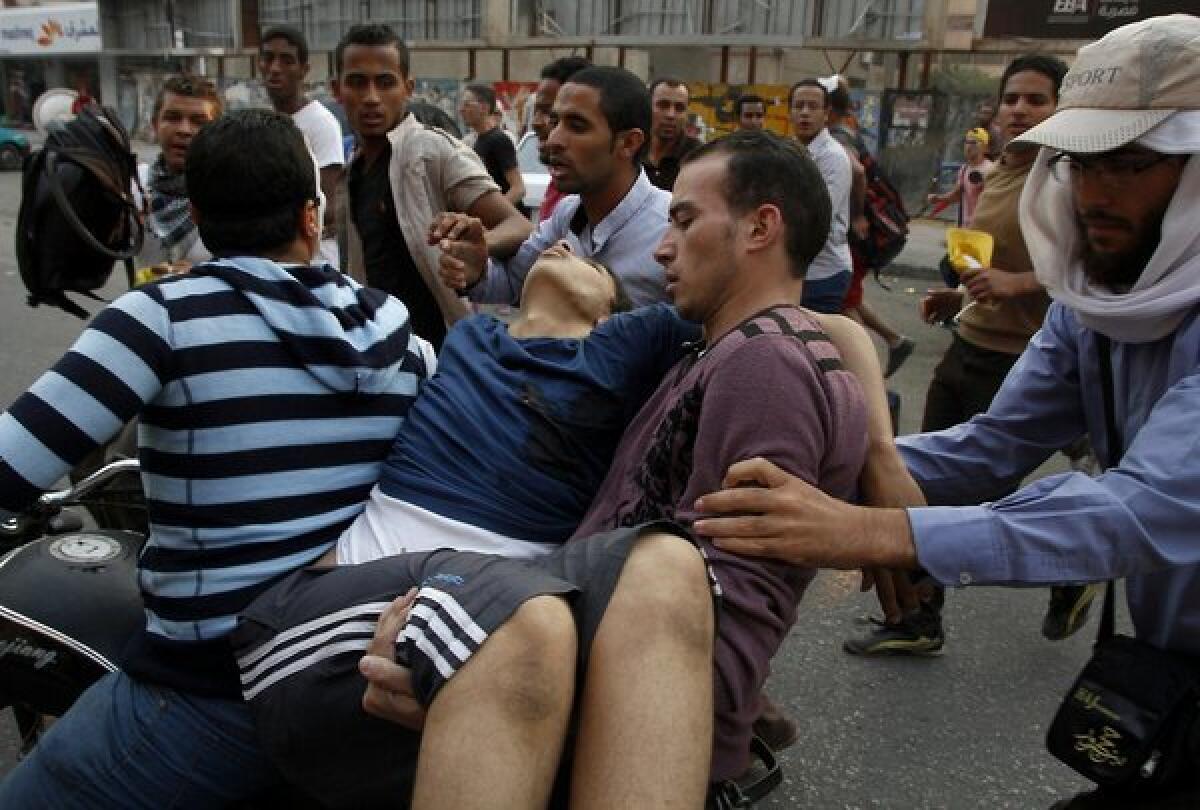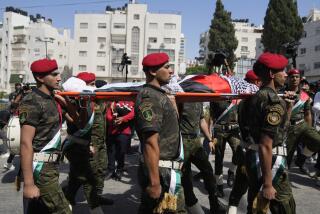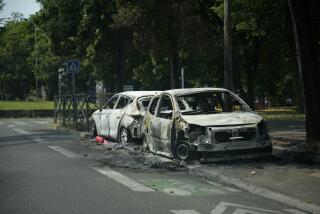Egyptian studentâs death at protest to be probed

CAIRO -- Apparently seeking to prevent a studentâs death from becoming a rallying cause for the backers of Egyptâs deposed Islamist president, authorities said Saturday they were investigating the circumstances of the teenagerâs killing.
The announcement came a day after Belal Ali Saber, a 19-year-old engineering student, died in a protest at the same site where security forces killed hundreds of followers of the ousted leader, Mohamed Morsi, in mid-August. Demonstrations were held in Cairo and several other cities on Friday by followers of Morsiâs Muslim Brotherhood to commemorate 100 days since the Egyptian military removed Morsi, the countryâs first democratically elected president, from power.
Authorities claimed that Saber and six other protesters attacked a police vehicle with firebombs during clashes near the Rabaa al Adawiya mosque, which has become a prime symbol of the pro-Morsi movement. Protesters often brandish posters showing four fingers raised in a salute -- playing on the name of the mosque, which is the word for four or fourth.
On Saturday, students at Saberâs university, Ain Shams, held a demonstration denouncing his killing.
âIn heaven, Belal,â they chanted. A photograph of a police officer standing over a partially visible body, identified as Saber, was circulated on social meda sites, carrying the caption: âHereâs the dog who killed Belal.â The officerâs purported name and address were also posted.
The Cairo prosecutorâs office announced Saturday that an autopsy would be conducted as part of an investigation, and that the police vehicle that Saber and other protesters are alleged to have attacked would also be examined. Half a dozen arrested protesters were being questioned in connection with the incident, prosecutors said.
Morsi and his followers have been the target of a wide-ranging crackdown since the July 3 coup that pushed him aside. Nearly all senior leaders of the Muslim Brotherhood, including Morsi, are in jail, together with up to 2,000 rank-and-file followers. The Brotherhood has been formally banned, and authorities have forcefully put down protests by the groupâs backers. Fifty-seven protesters died in clashes last Sunday, many of them shot dead as they tried to approach Tahrir Square, the epicenter of Egyptâs 2011 revolution.
Legal maneuvers against the Brotherhood continued apace. On Saturday a former senior leader of the group, Mahdi Akef, was referred to criminal court on charges of âinsulting judicial authority,â state media reported. The charges apparently stemmed from an interview with a Kuwaiti newspaper earlier this year in which he was quoted as asserting that the Egyptian judiciary was corrupt.
Akef had broken with Morsi prior to his overthrow, but was nonetheless caught up in the dragnet.
The ousting of Morsi and the subsequent harsh campaign against the Brotherhood prompted the Obama administration to suspend hundreds of millions of dollars in aid to Egyptâs powerful military, but U.S. officials have said it could be restored if the interim government takes meaningful steps toward democratization.
In more than three months in power, however, the Egyptian administration has taken a decidedly authoritarian stance, answering almost entirely to army chief Gen. Abdel Fattah Sisi and employing a state of emergency and other measures to keep a tight lid on dissent.
ALSO:
Powerful Cyclone Phailin forces massive evacuations in India
One week later, âDeath to U.S.A.â chant back in vogue in Tehran
Ex-Formula One test driver Maria de Villota, 33, found dead in hotelSpecial correspondent Ingy Hassieb in Cairo contributed to this report.
More to Read
Sign up for Essential California
The most important California stories and recommendations in your inbox every morning.
You may occasionally receive promotional content from the Los Angeles Times.









